
FAIR is a non-profit organization dedicated to providing well-documented answers to criticisms of the doctrine, practice, and history of The Church of Jesus Christ of Latter-day Saints.
Summary: Joseph Smith had in his possession three or four long scrolls, plus a hypocephalus (Facsimile 2). Of these original materials, only a handful of fragments were recovered at the Metropolitan Museum. The majority of the papyri remains lost, and has likely been destroyed. There are a number of criticisms related to the recovered fragments of the Joseph Smith papyri. These criticisms are addressed below. [1]
Video published by the Church History Department.
Summary: A collection of source quotes related to the Joseph Smith Papyri
Jump to details:
Jump to details:
Summary: Critics often assert that the Church did not identify the Joseph Smith Papyri as an Egyptian funerary text until after Egyptologists examined them. They also claim that the Church is hiding or "covering up" the papyri's actual contents. Both assertions are incorrect. In fact, the Church ran a multi-part series with color pictures of the papyri in the Improvement Era (the predecessor to the Ensign) less than two months after they were received from the Metropolitan Museum. The series repeatedly affirmed that the recovered papyri contained Egyptian funerary materials and not the text of Book of Abraham.
Jump to details:
Summary: We do not claim to know why the text of the Book of Abraham (or the missing Book of Joseph) is not in evidence on the fragments of papyrus that were recovered. Critics, of course, simply assume this to be conclusive evidence that Joseph was a fraud. From a believer's perspective, however, there are several possible theories to account for this: 1) The text was revealed much in the same manner as that of the Book of Mormon, without the need for the actual papyri, 2) The text was present on portions of the papyri that are missing, and 3) The Book of Abraham manuscript was attached to the Book of Breathings manuscript and was lost. 4) Perhaps there was a way of understanding the Egyptian ideograms anciently that is unknown to Egyptology in our day, yet to be discovered, deciphered or acknowledged, that could yield an interpretation of a text that is different than the standard Egyptological reading.
Summary: Among the early Book-of-Abraham-related-manuscripts that have survived from the days of Joseph Smith are a number of papers collectively referred to as the "Kirtland Egyptian Papers" (KEP). These pages were written while the Saints lived in Kirtland, Ohio, and were recorded in the general time frame that Joseph was translating the Book of Abraham. They are in the same handwriting of several of Joseph's scribes.
Life and Character |
|
Youth |
|
Revelations and the Church |
|
Prophetic Statements |
|
Society |
|
Plural marriage (polygamy) |
|
Death |
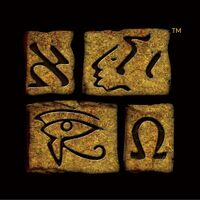
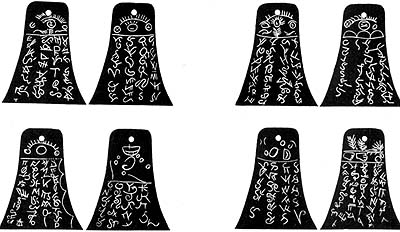
A set of small plates, engraved with characters of ancient appearance, were purported to have been unearthed in Kinderhook, Illinois, in April 1843. The so-called "Kinderhook plates" have been something of an enigma within the Mormon community since they first appeared. While there are faithful LDS who take a number of different positions on the topic of these artifacts, most have concluded that they were fakes.
Joseph Smith appears to have had the plates in his possession for about five days.
Joseph Smith's personal secretary, William Clayton said,
President Joseph has translated a portion [of the Kinderhook plates], and says they contain the history of the person with whom they were found; and he was a descendant of Ham, through the loins of Pharaoh, King of Egypt, and that he received his kingdom through the ruler of heaven and earth.
Chemical analysis performed by the Chicago Historical Society on one of the plates in 1981 showed that the plates were fake.[2] Before the release of the CHS' analysis, criticism of the episode from those outside of The Church of Jesus Christ of Latter-day Saints was infrequent.[3] After the release, criticism became much more frequent.[4] All critics have believed that this episode brings into question any claim of "inspiration" that Joseph used to translate the Kinderhook Plates and by extension any other revelations he received.
However, Joseph Smith "translated" a portion of those plates, not by claiming inspiration, but by comparing characters on the plates to those on his "Grammar and Alphabet of the Egyptian Language" (GAEL). (The GAEL was composed in Kirtland about the time of the translation of the Book of Abraham.) Joseph found one of the most prominent characters on the plates to match a character on the second page of characters in the GAEL. Both were boat shaped. The GAEL interpretation of this boat-shaped character included everything that William Clayton said Joseph said.
Corroborating this is a letter in the New York Herald for May 30th, 1843, from someone who signed pseudonymously as "A Gentile." Research shows "A Gentile" to be a friendly non-Mormon then living in Nauvoo by the name of Sylvester Emmons.[5] He wrote:
The plates are evidently brass, and are covered on both sides with hieroglyphics. They were brought up and shown to Joseph Smith. He compared them, in my presence, with his Egyptian Alphabet…and they are evidently the same characters. He therefore will be able to decipher them.
We know that Joseph was interested in languages. He studied Greek, Hebrew, and German in a secular manner. Therefore, we can easily believe that he attempted to translate the Kinderhook plates without assuming prophetic powers, which powers consequently remain credible.
There exist several accounts that describe the plates. Not all of the account agree on the details.
I have seen 6 brass plates which were found in Adams County by some persons who were digging in a mound. They found a skeleton about 6 feet from the surface of the earth which was 9 foot high. [At this point there is a tracing of a plate in the journal.] The plates were on the breast of the skeleton. This diagram shows the size of the plates being drawn on the edge of one of them. They are covered with ancient characters of language containing from 30 to 40 on each side of the plates. Prest J. has translated a portion and says they contain the history of the person with whom they were found and he was a descendant of Ham through the loins of Pharoah king of Egypt, and that he received his kingdom from the ruler of heaven and earth. [6]
Charlotte Haven claimed to have heard from a friend that Joseph:
said that the figures or writing on them was similar to that in which the Book of Mormon was written...thought that by the help of revelation he would be able to translate them. So a sequel to that holy book may soon be expected.[7]
Brigham Young also drew an outline of one of the Kinderhook plates in a small notebook/diary that he kept. Inside the drawing he wrote:
May 3—1843. I had this at Joseph Smith’s house. Found near Quincy.[8]
The Quincy Whig (a newspaper from a local town near Kinderhook) published their reaction to the plates. It reads:
Finally, a company of ten or twelve repaired to the mound, and assisted in digging out the shaft commenced by Wiley. After penetrating the mound about 11 feet, they came to a bed of limestone, that had apparently been subjected to the action of fire, they removed the stone, which were small and easy to handle, to the depth of two feet more, when they found SIX BRASS PLATES, secured and fastened together by two iron wires, but which were so decayed, that they readily crumbled to dust upon being handled. The plates were so completely covered with rust as almost to obliterate the characters inscribed upon them; but after undergoing a chemical process, the inscriptions were brought out plain and distinct... [9]
Mr. Smith has had those plates, what his opinion concerning them is, we have not yet ascertained. The gentleman that owns them has taken them away, or we should have given a fac simile of the plates and characters in this number. We are informed however, that he purposes returning with them for translation; if so, we may be able yet to furnish our readers with it.
Joseph Smith's journal entry for 7 May 1843 reads:
May 7[th] Sunday 1843. forenoon visited by several gentlemen concerning the plates which were dug out of a mound near quncy [Quincy] sent by Wm Smith to the office for Hebrew Bible & Lexicon— Mr Vickers the wire dancer called. A.M.— court of 1st Preside[n]cy met & adjond [adjourned] one week, 2 P.P. [p.m.] 399President not well— councellors acted.—
evening preaching by Elder [Orson] Hyde text Luke 21 chapter.[10]
Parley P. Pratt's account conflicts with Clayton's in some regards:
Six plates having the appearance of Brass have lately been dug out of a mound by a gentleman in Pike Co. Illinois. They are small and filled with engravings in Egyptian language and contain the genealogy of one of the ancient Jaredites back to Ham the son of Noah. His bones were found in the same vase (made of Cement). Part of the bones were 15 ft. underground. ... A large number of Citizens have seen them and compared the characters with those on the Egyptian papyrus which is now in this city. [11]
Comparison of Clayton and Pratt Accounts of Kinderhook Plates
| Story Element | Clayton Account | Clayton Correct? | Pratt Account | Pratt Correct? |
|---|---|---|---|---|
| Skeleton | Yes | Incorrect | Yes | Incorrect |
| Size skeleton | 9 feet | Incorrect | Normal size | Incorrect |
| Depth buried | 6 feet | Incorrect | 15 feet | Incorrect |
| Location plates | On breast of skeleton | Incorrect | No mention | N/A |
| Dig site | Adams county | Incorrect | Pike county | Correct |
| Cement vase | No mention | Correct | Mention | Incorrect |
The contents of the Plates, together with a Fac-simile of the same, will be published in the ‘Times & Seasons,’ as soon as the translation is completed.[12]
Wilbur Fugate, one of the perpetrator's of the hoax, wrote a few decades later:
Our plans worked admirably. A certain Sunday was appointed for the digging. The night before, Wiley went to the Mound where he had previously dug to the depth of about eight feet, there being a flat rock that sounded hollow beneath, and put them under it. On the following morning quite a number of citizens were there to assist in the search, there being two Mormon elders present (Marsh and Sharp). The rock was soon removed but some time elapsed before the plates were discovered. I finally picked them up and exclaimed, 'A piece of pot metal!' Fayette Grubb snatched them from me and struck them against the rock and they fell to pieces. Dr. Harris examined them and said they had hieroglyphics on them. He took acid and removed the rust and they were soon out on exhibition. Under this rock (which) was dome-like in appearance (and) about three feet in diameter, there were a few bones in the last stage of decomposition, also a few pieces of pottery and charcoal. There was no skeleton found. [13]
Later he declared in affidavit:
Those plates are a HUMBUG, gotten up by Robert Wiley, Bridge Whitton and myself. … None of the nine persons who signed the certificate knew the secret, except Wiley and I. We read in Pratt’s prophecy that ‘Truth is yet to spring out of the earth.’ [The quote is from Parley P. Pratt’s 1837 missionary tract Voice of Warning.] We concluded to prove the prophecy by way of a joke. We soon made our plans and executed them. Bridge Whitton cut them out of some pieces of copper; Wiley and I made the hieroglyphics by making impressions on beeswax and filling them with acid and putting it on the plates. When they were finished we put them together with rust made of nitric acid, old iron and lead, and bound them with a piece of hoop iron, covering them completely with the rust.[14]
Stanley Kimball published findings demonstrating the plates a hoax:
A recent electronic and chemical analysis of a metal plate (one of six original plates) brought in 1843 to the Prophet Joseph Smith in Nauvoo, Illinois, appears to solve a previously unanswered question in Church history, helping to further evidence that the plate is what its producers later said it was—a nineteenth-century attempt to lure Joseph Smith into making a translation of ancient-looking characters that had been etched into the plates.[15]
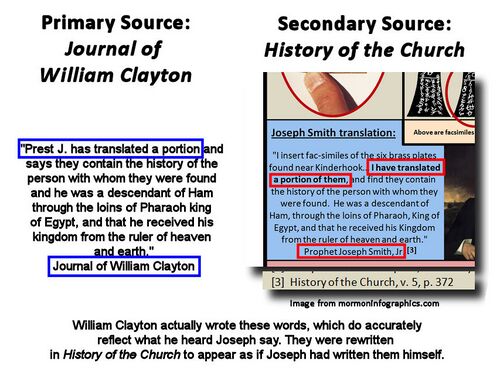
The following is from Stanley B. Kimball, "Kinderhook Plates Brought to Joseph Smith Appear to Be a Nineteenth-Century Hoax," Ensign, August 1981 off-site
These two oblique references to a “translation” were followed thirteen years later by a more direct published statement that until recently was wrongly thought to have been written by Joseph Smith himself. On September 3 and 10, 1856, the following paragraphs appeared in the Deseret News as part of the serialized “History of Joseph Smith”:
“[May 1, 1843:] I insert fac similes of the six brass plates found near Kinderhook, in Pike county, Illinois, on April 23, by Mr. R. Wiley and others, while excavating a large mound. They found a skeleton about six feet from the surface of the earth, which must have stood nine feet high. The plates were found on the breast of the skeleton, and were covered on both sides with ancient characters.
“I have translated a portion of them, and find they contain the history of the person with whom they were found. He was a descendant of Ham, through the loins of Pharaoh, king of Egypt, and that he received his kingdom from the ruler of heaven and earth.” (Then followed a reprint of material from the Times and Seasons article.)
Although this account appears to be the writing of Joseph Smith, it is actually an excerpt from a journal of William Clayton. It has been well known that the serialized “History of Joseph Smith” consists largely of items from other persons’ personal journals and other sources, collected during Joseph Smith’s lifetime and continued after the Saints were in Utah, then edited and pieced together to form a history of the Prophet’s life “in his own words.” It was not uncommon in the nineteenth century for biographers to put the narrative in the first person when compiling a biographical work, even though the subject of the biography did not actually say or write all the words attributed to him; thus the narrative would represent a faithful report of what others felt would be helpful to print. The Clayton journal excerpt was one item used in this way. For example, the words “I have translated a portion” originally read “President J. has translated a portion. …”
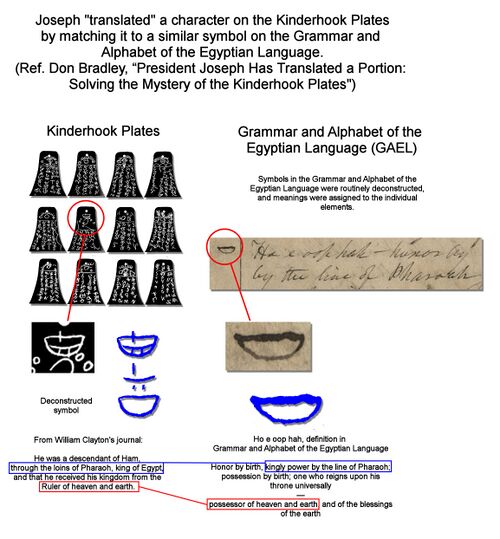
Don Bradley presented compelling evidence during his 2011 FAIR Conference presentation that Joseph Smith did indeed attempt to translate a character on the Kinderhook Plates.[16] Bradley noted that William Clayton's account is likely representing personal and specific knowledge acquired from Joseph Smith, since evidence indicates that he made his journal entries that day while he was at the Prophet's home. Clayton's account states that
Prest J. has translated a portion and says they contain the history of the person with whom they were found and he was a descendant of Ham through the loins of Pharoah king of Egypt, and that he received his kingdom from the ruler of heaven and earth.
Bradley noted that one of the most prominent characters on the Kinderhook Plates (a symbol shaped like a boat), when broken down into its individual elements matched a symbol found on page 4 (the second page of characters) of the Grammar and Alphabet of the Egyptian Language (GAEL), often referred to as the "Egyptian Alphabet. The GAEL provides meanings for the individual symbols, and the meaning assigned to the particular symbol found on the plates supports the translation reported to have been provided by Joseph.
The conclusion is that Clayton's account appears to be accurate, that Joseph did attempt to translate "a portion" of them by non-revelatory means, and the translation provided matches a corresponding symbol and explanation in the GAEL.
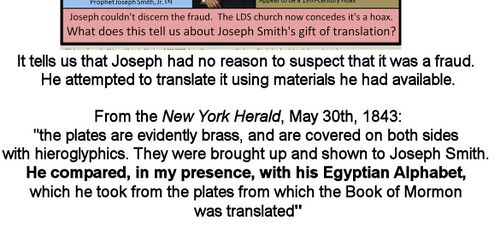
At the time that Joseph Smith translated the Book of Mormon, he only claimed the ability to translate by the "gift and power of God." Over time, Joseph studied other languages and wished to learn to translate by other means. His attempt to use the Grammar and Alphabet of the Egyptian Language (a document that he and others had created) to attempt a translation of the Kinderhook Plates fits in with this desire. Since only a single character "matched," Joseph would have been unable to continue to translate the plates in this manner. This may explain why such a translation was never produced: beyond the single character which happened to match, it would not have even been possible to translate the fraudulent plates either manually or by the "gift and power of God." Therefore, no translation was ever produced.
A critical graphic from "mormoninfographics" states that "Joseph didn't discern the fraud. The LDS Church now concedes it's a hoax. What does this tell us about Joseph Smith's gift of translation?"
Simply put, Joseph's attempt to translate the plates manually tells us that he didn't attempt to translate the plates using the "gift and power of God."
It should be noted that the critical "mormoninfographic" includes a portion of a quote from History of the Church that is written as if it came from Joseph Smith.
The graphic is correct, but it is useful to know the actual source of the quote used by History of the Church.:
I insert fac-similes of the six brass plates found near Kinderhook, in Pike county, Illinois, on April 23, by Mr. Robert Wiley and others, while excavating a large mound. They found a skeleton about six feet from the surface of the earth, which must have stood nine feet high. The plates were found on the breast of the skeleton and were covered on both sides with ancient characters. I have translated a portion of them, and find they contain the history of the person with whom they were found. He was a descendant of Ham, through the loins of Pharaoh, king of Egypt, and that he received his kingdom from the Ruler of heaven and earth.
The quote in question was written in William Clayton's journal. It was rewritten in the first person (as if Joseph Smith had said it himself) when it was included in History of the Church. Clayton's journal is the primary source, which was used in History of the Church (a secondary source).
The quote by William Clayton is indeed accurate: Joseph Smith did attempt to translate a portion of the Kinderhook Plates. This is explained in the following section.
The following is from Stanley B. Kimball, "Kinderhook Plates Brought to Joseph Smith Appear to Be a Nineteenth-Century Hoax," Ensign, August 1981 off-site
These two oblique references to a “translation” were followed thirteen years later by a more direct published statement that until recently was wrongly thought to have been written by Joseph Smith himself. On September 3 and 10, 1856, the following paragraphs appeared in the Deseret News as part of the serialized “History of Joseph Smith”:
“[May 1, 1843:] I insert fac similes of the six brass plates found near Kinderhook, in Pike county, Illinois, on April 23, by Mr. R. Wiley and others, while excavating a large mound. They found a skeleton about six feet from the surface of the earth, which must have stood nine feet high. The plates were found on the breast of the skeleton, and were covered on both sides with ancient characters.
“I have translated a portion of them, and find they contain the history of the person with whom they were found. He was a descendant of Ham, through the loins of Pharaoh, king of Egypt, and that he received his kingdom from the ruler of heaven and earth.” (Then followed a reprint of material from the Times and Seasons article.)
Although this account appears to be the writing of Joseph Smith, it is actually an excerpt from a journal of William Clayton. It has been well known that the serialized “History of Joseph Smith” consists largely of items from other persons’ personal journals and other sources, collected during Joseph Smith’s lifetime and continued after the Saints were in Utah, then edited and pieced together to form a history of the Prophet’s life “in his own words.” It was not uncommon in the nineteenth century for biographers to put the narrative in the first person when compiling a biographical work, even though the subject of the biography did not actually say or write all the words attributed to him; thus the narrative would represent a faithful report of what others felt would be helpful to print. The Clayton journal excerpt was one item used in this way. For example, the words “I have translated a portion” originally read “President J. has translated a portion. …”
So, a larger conclusion that we can draw is that we’ve got both the smoking-gun – the GAEL that he uses to translate, and we’ve got an eyewitness. We know exactly how Joseph Smith attempted to translate from the Kinderhook plates and obtain the content that Clayton says he did. A larger conclusion, then, that we can draw is that Joseph Smith translated from the Kinderhook plates not by revelation, but by non-revelatory means.
Key sources |
|
Wiki links |
|
FAIR links |
|
Online |
|
Video |
Load video YouTube YouTube might collect personal data. Privacy Policy
Load video YouTube YouTube might collect personal data. Privacy Policy
Load video YouTube YouTube might collect personal data. Privacy Policy |
Print |
|
Navigators |
|
Sub categories |
Critical sources |
|
Critical sources |
|

FAIR is a non-profit organization dedicated to providing well-documented answers to criticisms of the doctrine, practice, and history of The Church of Jesus Christ of Latter-day Saints.
We are a volunteer organization. We invite you to give back.
Donate Now